International analysts and rescue workers on the ground are accusing Libyan warlord Khalifa Haftar of exploiting the devastating floods in Derna to tighten his grip on the eastern half of the country.
The death toll from the floods caused by Mediterranean Storm Daniel last week reached 11,300 at last count, and over 10,000 more people remain missing. From the earliest hours of the crisis, international relief agencies have complained about the difficulty of getting aid to Derna because of Libya’s divided and dysfunctional government.
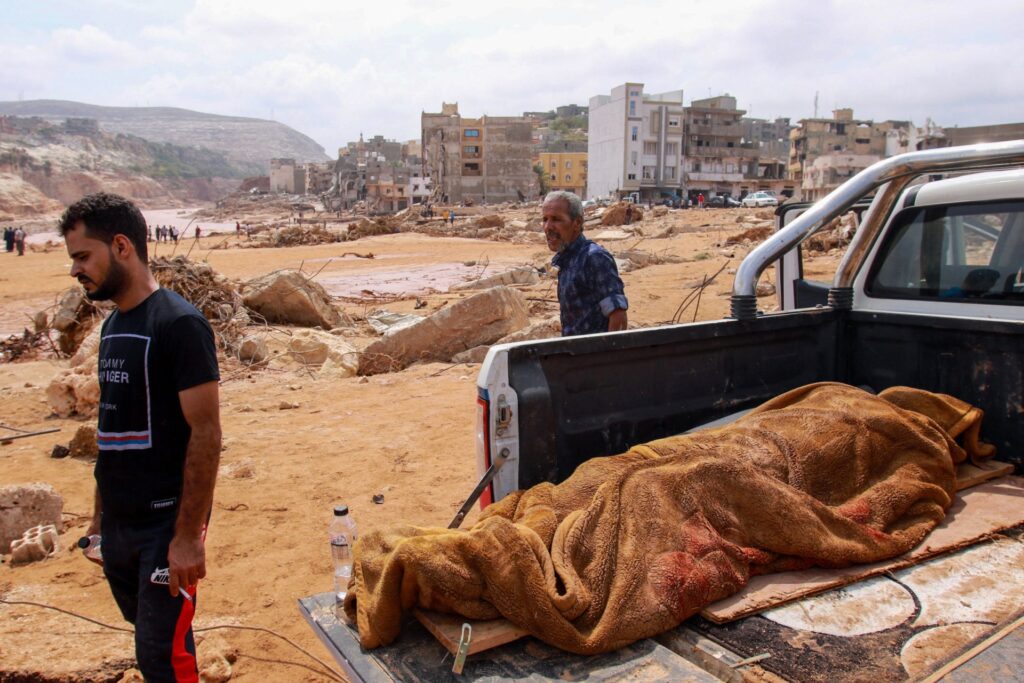
People walk past the body of a flash flood victim in the back of a pickup truck in Derna, Libya, on September 11, 2023. (AFP via Getty Images)
The UK Guardian on Sunday quoted rescue workers who found themselves “surrounded by militants from the Libyan National Army [LNA],” Haftar’s military organization. The militants were allegedly there to help Haftar “keep an iron grip over vital assistance arriving in the crisis-stricken city.”
Haftar himself toured Derna on Friday, conspicuously praising his swarms of LNA troops as copiously as he praised the first responders themselves. Haftar’s son Saddam, who heads one of the LNA’s allied militia groups, “quickly used his role as the head of Libya’s disaster response committee to legitimize his international standing while keeping a tight grip on aid.”
Another Haftar son, Elseddik, decided the day of the storm would be a good time to announce his candidacy for president of all of Libya, assuming Libya ever manages to hold a nationwide election.
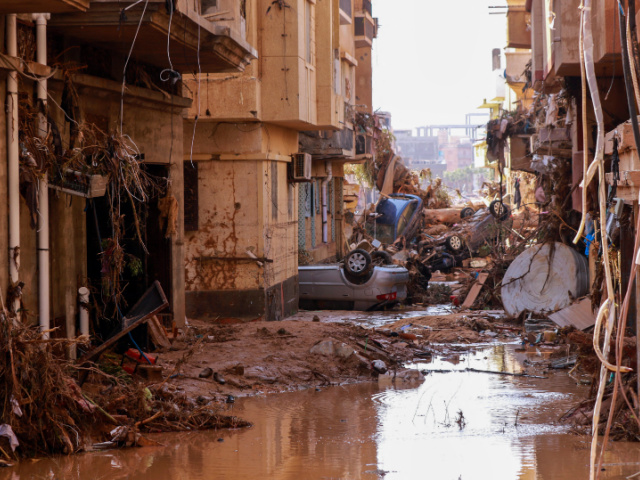
Overturned cars lay among other debris caused by flash floods in Derna, Libya, on September 11, 2023. (AFP via Getty Images)
“Everything is concentrated in the hands of the Haftar family. I wish I could tell you that there are other power centers in eastern Libya, but there’s no such thing,” sighed Royal United Services Institute Associated Fellow Jalel Harchaoui.
He continued:
Saddam is positioning himself as the boss. You need to physically access victims and the city, and to do that they depend on his goodwill. Slowly things are orienting towards one conclusion, which is that only mid-level officials can be blamed. A large part of the conclusion is excluded from the start, it’s not an open investigation.
Harchaoui found it very unlikely that the Haftar clan would permit a vigorous investigation into Derna’s horrifying loss of life and the role government officials played in the disaster. The internationally-recognized western government of Libya has vowed to conduct such an investigation.
“Essentially, there is a military presence that is creating bottlenecks rather than being conducive to the provision of relief,” charged Atlantic Council Analyst Emadeddin Badi.
Badi continued:
The main thrust of relief efforts was not facilitated by the military leadership, which had a vested interest in appearing in control while skirting responsibility and victim-blaming, but instead by volunteers, medical teams, Red Crescent, boy scouts and foreign search and rescue teams.
WATCH: Rescuers in Libya Respond to Deadly, Massive Flooding
Video Source: Libyan Red Crescent Bayda via StoryfulBadi dismissed Haftar’s tour of flood-ravaged Derna as a “PR stunt” that pointlessly froze rescue work across the city for an hour.
Al Jazeera News noted on Friday that one of the many reasons Derna’s infrastructure was unable to withstand the flood waters from Mediterranean Storm Daniel is that Haftar laid siege to the city from 2015 to 2017, determined to stamp out the last pocket of resistance to his rule in the east.
“The city was torn apart by intensive bombardments and ferocious ground fighting,” Al Jazeera observed.
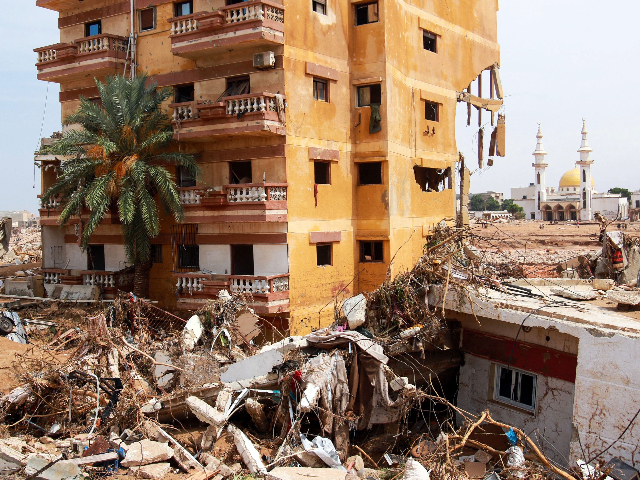
An area damaged by flash floods is pictured in Derna, Libya, on September 11, 2023. (AFP via Getty Images)
Hani Shennib, president of the National Council on U.S.-Libya Relations, said things were not much better under dictator Moammar Qaddafi, who was deposed by the U.S. invasion in 2011.
“This is not new. This is going on for 42 years. It has caused alienation and political turmoil since the days of Gaddafi. Every minister of health and prime minister would drop by Derna, would make statements about supporting the city, and then ignore it completely,” he said.
Sadeq Institute Founder Anas El Gomati said:
Corruption and financial mismanagement are the cause behind failing infrastructure that has plagued Libya for decades, but the successive regimes are culpable, and it is the military investment authority that has cannibalized Libya’s public infrastructure in the east, destroying it to be smuggled and sold for scrap metal.
“The erosions in the dams in Derna are not new. They have been reported repeatedly, including in scientific journals from 2011 and moving on. No official has paid attention to it,” Shennib continued.
Hundreds of Derna residents protested against the authorities on Wednesday and demanded accountability, including the resignation of the speaker for the eastern parliament, Aguila Saleh.
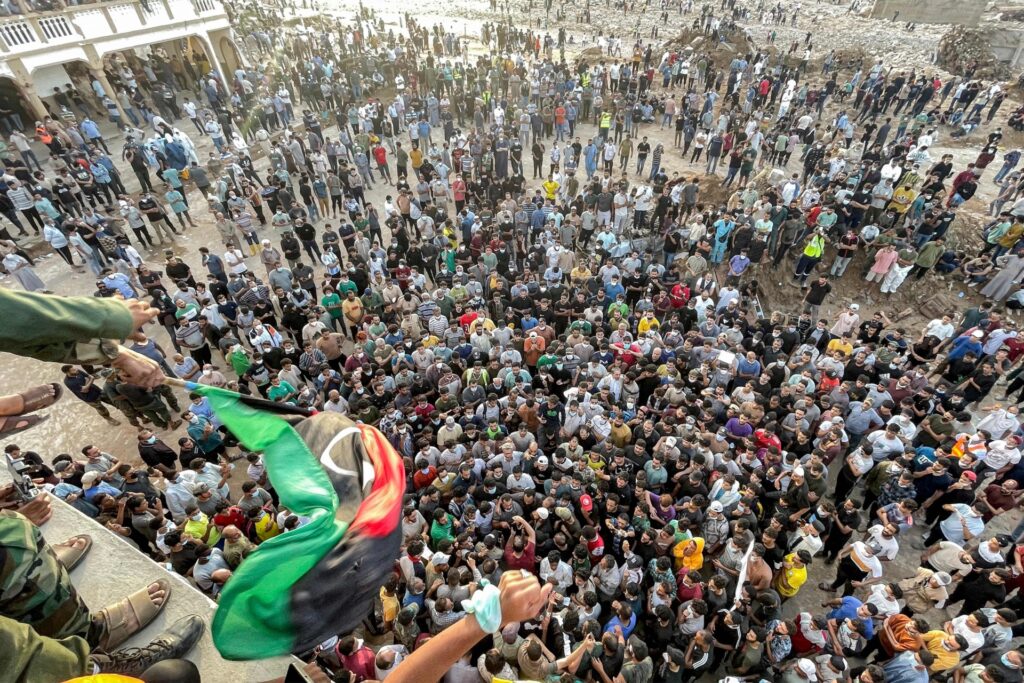
People gathered for a protest outside the surviving Al-Sahaba mosque in Derna, Libya, on September 18, 2023. (HUSSAM AHMED/AFP via Getty Images)
An angry mob set fire to the home of former Derna Mayor Abdulmenam al-Ghaithi. The eastern government claims Ghaithi has been suspended from his position.
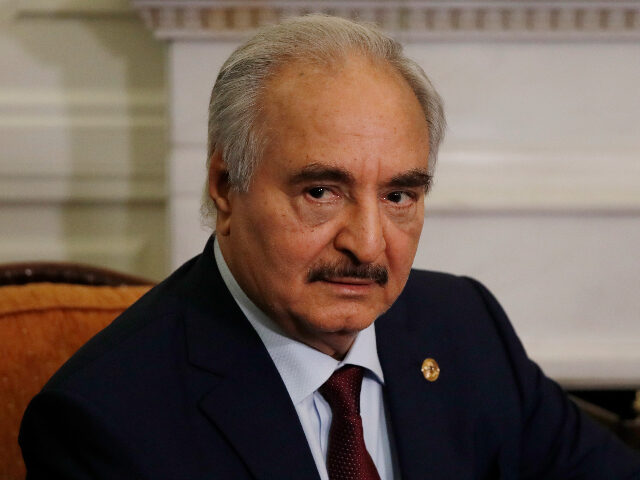
COMMENTS
Please let us know if you're having issues with commenting.